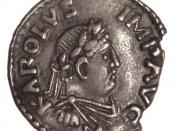In spite of the biographical nature of Einhard's Life of Charlemagne, a lot can be learned about the key aspects of Frankish society. During the 8th and 9th centuries, the Franks came to dominate the European continent on the heels of imperial disintegration. In assessing the methodology by which the Franks were able to achieve such power, three things must be taken into consideration: The basis of political authority, the importance of family and family relationships and values and personal qualities, which were esteemed. Through the biography of Charlemagne, thought by many to be the greatest ruler of the Frankish Empire, we are able to learn a great deal about these aspects of Frankish society. Since Einhard, Charlemagne's biographer was a member of Charlemagne's court, much of what is learned about Frankish society is in reference to Charlemagne's relations with the different of society.
Political authority played a significant role in the rise of the Frankish Empire.
Charlemagne's role as the political leader of the empire is one of the key factors of the success of the . The basis for Charlemagne's power was in essence his double royal authority; not only was he the king of the Frankish Empire, but he was also crowned, Emperor of Rome. Before Charlemagne and his father, Pepin's, reigns, basis of political authority did not lie with the king. Einhard writes, "It had really lost all power years before and it no longer possessed anything at all of importance beyond the empty title of king. The wealth and the power of the kingdom were held tight in the hands of certain leading officials of the court, who were called the mayors of the palaceâ¦The king possesses nothing at all of his own, except a single estate with an extremely small revenue" (Einhard, 55). It...


![King [Haakon] and Queen [Maud] of Norway and [Crown] Prince Olaf (LOC)](https://s.writework.com/uploads/11/119823/king-haakon-and-queen-maud-norway-and-crown-prince-olaf-loc-thumb.jpg)